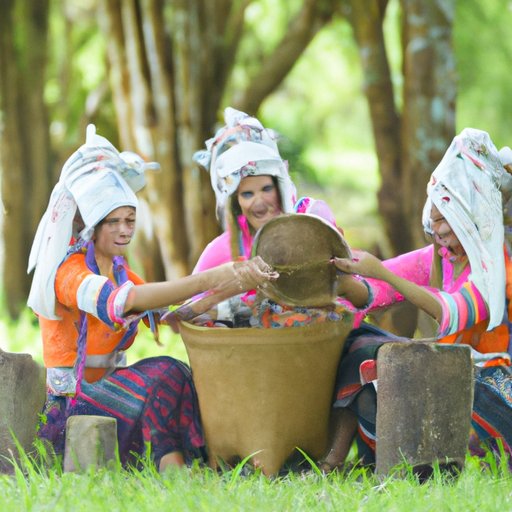Introduction
Traditional culture is a set of beliefs, customs, and practices that have been passed down from generation to generation. It can be found in countries around the world, although each region may have its own unique set of traditions. This article will explore the history of traditional culture, its distinguishing features, and how technology has impacted it. It will also examine regional variations and identify opportunities to preserve traditional culture in modern society.

Exploring the History of Traditional Culture
Traditional culture has been around since ancient times. According to anthropologist Jack Goody, “The transmission of cultural forms from one generation to another is the very essence of tradition.”1 Over time, traditional culture has evolved to reflect the changing needs of society. For example, some cultures have adopted new technologies to improve their agricultural practices, while others have developed new forms of art or literature to express their values.

Examining the Values and Practices of Traditional Culture
Traditional culture is characterized by its distinct values and practices. These can include religious beliefs, social norms, language, music, and more. In many cases, these values are passed down through generations and are seen as essential to the identity of a particular group or nation. For example, in Japan, respect for elders and adherence to the principles of harmony and politeness are central to the country’s culture.2
How Technology Has Impacted Traditional Culture
In recent years, technology has had a major impact on traditional culture. On the one hand, it has enabled people to access information quickly and easily, which has made it easier for them to learn about different cultures. On the other hand, it has also posed challenges to traditional practices, such as the decline of local languages due to the spread of English across the globe.3 As a result, there is a need to find ways to preserve traditional culture in the face of technological advances.
Comparing Traditional Culture Across Different Countries
Traditional culture varies significantly from one country to another. While some countries may share certain values or practices, others may have completely different ones. For instance, in China, filial piety is an important part of the culture, while in France, people often take pride in their individualism.4 Understanding these regional variations can help us gain a better appreciation of traditional culture as a whole.
Investigating the Impact of Traditional Culture on Modern Society
Traditional culture has had a significant influence on modern society. It has shaped our values and beliefs, as well as our attitudes towards different social issues. However, it has also given rise to cultural appropriation, where elements of one culture are adopted without proper understanding or respect.5 It is important to be aware of this issue and to ensure that traditional culture is respected and celebrated.

Identifying Opportunities to Preserve Traditional Culture
Despite the challenges posed by technology and globalization, there are still many opportunities to preserve traditional culture. One way is to focus on education, such as teaching traditional skills and knowledge to younger generations. Another is to create opportunities for cultural exchange, such as festivals or exhibitions that showcase the diversity of traditional cultures. Finally, governments can provide financial support for projects that aim to conserve and promote traditional culture.6
Conclusion
Traditional culture is a valuable part of our shared heritage. It provides us with a sense of identity and belonging, as well as a connection to our past. Despite the challenges posed by technology and globalization, there are still many opportunities to preserve traditional culture. By educating younger generations, creating opportunities for cultural exchange, and providing financial support for conservation efforts, we can ensure that traditional culture remains a vibrant and integral part of our society.
(Note: Is this article not meeting your expectations? Do you have knowledge or insights to share? Unlock new opportunities and expand your reach by joining our authors team. Click Registration to join us and share your expertise with our readers.)
